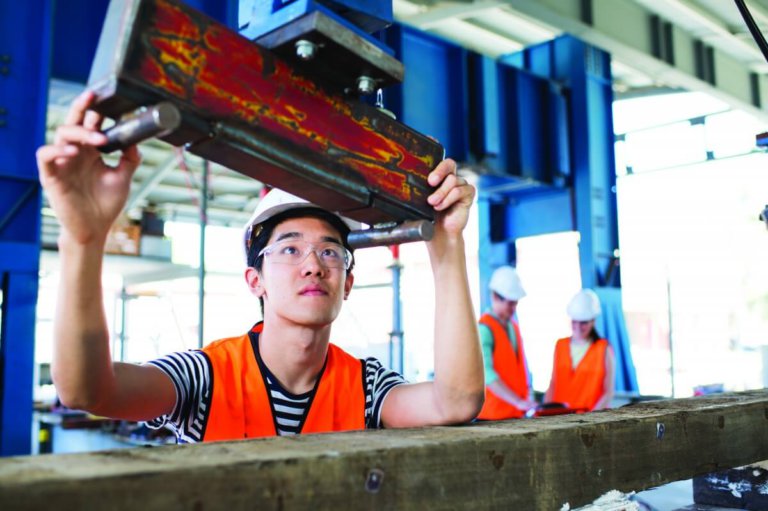
Engineers play an important role in tackling some of the world’s most pressing problems, be it the infrastructure we depend on or contributions to clean and renewable energy efforts to address the growing environmental crisis. As such, engineers are in high demand in just about every sector imaginable.
However, specialised knowledge in engineering, including those that merge technical and non-technical skills, can improve career outcomes. According to the Engineering Vacancies Report Trends by Engineers Australia, experts predict there will be more than 5,600 engineering openings every year for the foreseeable future.
Meanwhile, a postgraduate degree can also improve your salary prospects. The 2018 Graduate Outcomes Survey National Report found that the median salary of postgraduate coursework graduates employed full-time was AU$83,300.
Aspiring masters students looking to study in an affordable, multicultural and inspiring study environment may want to consider Curtin University. Located in Perth, Curtin gives students the chance to explore the natural wonders of Western Australia and enjoy a lower cost of living than east coast cities.

Source: Curtin University, Faculty of Science and Engineering
When you become a Curtin student, you join one of the world’s best young universities. Curtin is ranked in the top one percent of universities worldwide in the Academic Ranking of World Universities (ARWU) 2019 and 13th nationally in the 2019-20 QS World University Rankings.
Postgraduate degrees under the Faculty of Science and Engineering are forward-looking and responsive to the changing needs of industries, helping students develop the skills needed to advance their careers or take it in a new direction.
Moulding high calibre engineering professionals
At Curtin, students can choose from a wide range of postgraduate programs, including the Master of Professional Engineering. This two-year program – ideal for graduates from a four-year engineering qualification – helps students acquire the technical knowledge, skills and professional competencies to work as a professional engineer upon graduation. Applicants without an engineering qualification can qualify by completing a one-year Graduate Diploma in Professional Engineering to gain entry to the two-year program.
It covers a range of engineering majors including Chemical, Civil, Electrical Engineering, Mechanical, Petroleum, Software and Subsea engineering.

Source: Curtin University, Faculty of Science and Engineering
In fact, Curtin is the only university in Australia that teaches Subsea Engineering – a specialist role which is arguably one of the most technically complex aspects of the offshore petroleum industry. The course units cover the latest technologies involved in offshore oil and gas production, before finishing with an industry-based project, where students engage with experienced educators who have worked in the oil and gas industry. Past students have interned at renowned companies such as Woodside, Chevron, Shell, BHP and Santos, as well as service companies like TechnipFMC, Onesubsea and Wood Group.
Most of Curtin’s subsea graduates are currently employed in Australia by major oil and gas companies and also internationally, in various positions such as reservoir engineer, drilling engineer and production/subsurface engineer. Graduates can earn a salary of AU$98,000 or above AU$120,000, depending on experience.
Another in-demand specialisation students may want to consider is electrical engineering, which is one of the most sought-after specialisations in Australia, and graduates can expect to branch into various industries, be it professional, scientific or even manufacturing fields, and earn a salary of AU$2,160 per week – higher than the average of AU$1,460.
Students of this major can choose from three streams: embedded systems, which examines topics such as embedded systems in field-programmable gate arrays (FPGAs) and embedded software engineering; telecommunications and networking, which explores the technologies and design of mobile radio communications, sensor networks and data network security; and emerging power systems, a stream that addresses challenges in the generation, transmission and distribution of electricity.

Source: Curtin University, Faculty of Science and Engineering
At Curtin, students will be immersed in technology-rich learning environments, including The Green Electric Energy Park (GEEP), an innovative laboratory that features futuristic power-system concepts based on environmentally friendly, renewable energy technologies.
Another area of Curtin’s expertise includes Petroleum Engineering, where students can undertake different projects while undergoing real industry-based projects and assignments. Graduates can work as a petroleum engineer, hydrocarbon reservoir engineer and hydrocarbon production engineer, in both local and international corporations active in oil and gas, including Woodside, Chevron, Shell, BHP Billiton, ExxonMobil, ConocoPhillips, Schlumberger, Halliburton, among others. Salary-wise, graduates can expect to earn some AUD$2,037 per week – much higher in comparison to the average AU$1,230.
To ensure career-readiness, students experience at least 12 weeks of professional practice and keep a formal logbook to record their journey. They learn to solve industry problems in innovative ways that are always culturally sensitive. In their final year, students complete a major research or design project that draws upon and integrates the knowledge and skills attained throughout the course.
Completion of the Master of Professional Engineering course demonstrates attainment of the Stage 1 competency standards for Professional Engineers required by Engineers Australia.

Source: Curtin University, Faculty of Science and Engineering
Flanked by a faculty with strong research and industry experience, Curtin’s students are poised for success. The university is recognised internationally as a leader for the quality of its research higher degrees. Underpinning research endeavours are strong partnerships with industry, business and government, which result in engineering graduates benefitting the community locally, nationally and globally.
There’s also a variety of student clubs and volunteering opportunities to build leadership skills, connect with new people and make a positive difference. Some volunteering activities acknowledge students’ hard work on the Curtin Extra Certificate, which formally recognises student development through co-curricular engagement. Apart from its world-class postgraduate degrees, Curtin also offers Massive Open Online Courses (MOOCs) for anyone to complete short courses on a variety of topics online for free.
So, if you’re looking to take your engineering career to the next level, consider this two-year postgraduate engineering degree from Curtin.
Follow Curtin University on Facebook, Twitter, Instagram, YouTube and LinkedIn
Liked this? Then you’ll love these…
Engineering a sustainable future
4 APAC universities that are nurturing tomorrow’s engineering talent







